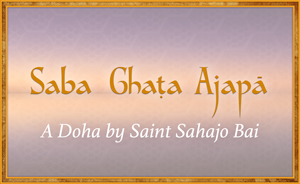Sahajo Bai
Sahajo Bai (c 1725) lived in Delhi and from the age of eleven served her Guru. The word sahaja connotes “the essence of simplicity,” and this virtue permeates Sahajo Bai’s life and work.
By age eighteen, Sahajo Bai had composed her master-work, Sahaj Prakash, a collection of eighty-five songs, many of them couplets called dohas. Throughout her life, Sahajo Bai proclaimed the value of devotional chanting, advising seekers to immerse themselves in love for the Lord by chanting the divine name. She spoke of the body as a vehicle for attaining God, and she followed this view with zeal, meditating often on the inner sound, chanting the mantra So’ham at regular intervals throughout day and night, and studying sacred texts.



